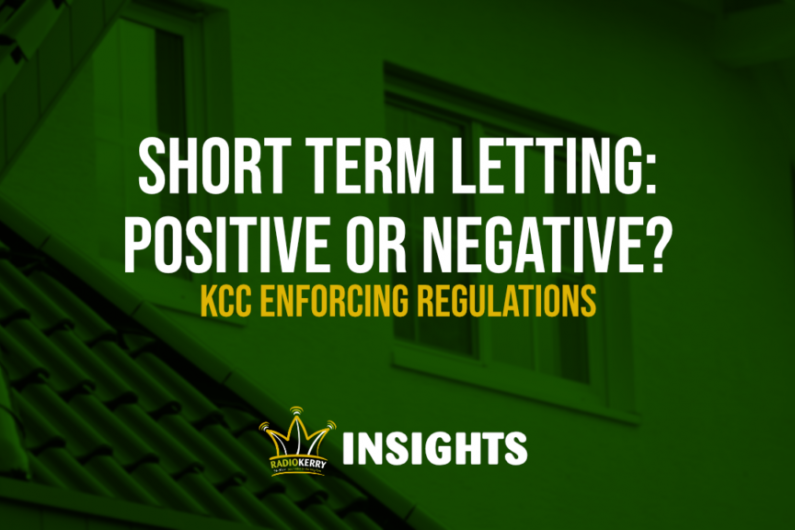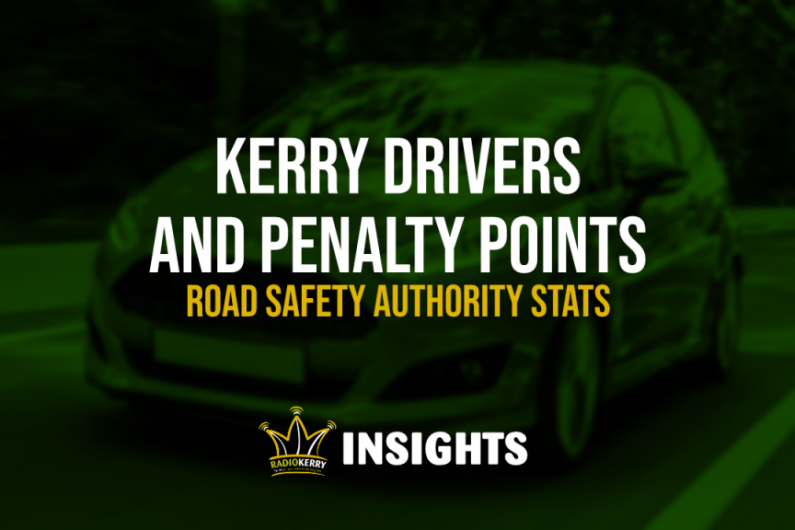From 30th June 2019, the Central Credit Register is taking credit information on hire purchase, PCPs and similar type of finance for loans of €500 or more.
In response to a query from Radio Kerry, the Central Bank says the CCR is also obliged to request a borrower’s credit report when considering these types of loans if the amount is for €2,000 or more from the 30th October of this year.
These changes affect a number of finance options, including PCPs.
First up, what are PCPs?
PCP stands for personal contract plans, which are used to finance the purchase of a vehicle. This is how they work.
First up, a deposit: This is typically between 10% and 30% of the value of the car. Your deposit can be paid in cash or, if you already own a car, you can trade it in as your deposit.
Monthly repayments: PCPs usually last for three years and they generally have low monthly repayments. This can make them seem more affordable compared to other forms of finance. The reason the monthly repayments are low is because you don’t pay for a large portion of the cost of the car until the end of the contract.
A large, final payment: this is how much it will cost you to own the car at the end of the contract. This figure is set at the beginning of the contract by the lender.
The main difference between a PCP and a personal loan is that with a personal loan you borrow the money, pay for your car, and own it immediately. With a PCP you don’t own the car, you are essentially hiring it for an agreed period of time, typically three years. You only own it if you pay the Guaranteed Minimum Future Value. This is important because if you were to run into financial difficulty during the term of your contract you wouldn’t be able to sell your car unless you had permission from the lender – as they are the legal owner of the car.
PCPs can appear very attractive because they usually have low monthly repayments.
You also have the convenience of being able to sort out your finance and pick your car in the same place.
It has to be said that PCPs are ideal for some customers, and by covering it here, we’re not insinuating there’s anything wrong with them. However, PCPs are very complex compared to other types of car finance, and some local financial institutions told Radio Kerry they’re seeing an increase in the number of people coming for loans to pay off lump sums in relation to PCPs.
Can you tell me a few more advantages and disadvantages of PCPs?

What happens at the end of the contract, which is typically a three-year contract?
(https://www.ccpc.ie/consumers/money/loans/paying-for-your-car/pcp/)
At the end of your contract you have a number of options:
- Pay the GMFV and own the car. Until you make this final payment you don’t own the car – the lender does. Unless you’ve been saving for this lump-sum payment, it may mean having to take out a personal loan to pay for it. Alternatively, your lender may be willing to arrange finance, for example a Hire Purchase (HP) agreement to cover the GMFV when the PCP contract ends.
- Hand the car back. Be aware that if you hand the car back, while you generally don’t have to pay the car dealer anything more, you might have to pay a penalty if you haven’t met all the terms and conditions. For example, if you have exceeded any mileage limits or if there’s excessive ‘wear and tear’ on the car. There are also requirements about where and when you get your car serviced.
- Enter into another PCP contract. The deposit you put down for your first car won’t be given back to you. If the market value of your car is greater than the GMFV then you may have some equity to put towards a deposit on a new car. For example, if the GMFV is €10,000 but the car is worth €12,000, you will have €2,000 to use as a deposit for your next car. The value of the car will depend on its condition.
What happens if the car is worth less than the Guaranteed Minimum Future Value?
When the value is set at the beginning of the contract it’s usually set at less than the expected value of the car at the end of the contract. The idea being that there will be some equity in the car at the end of your contract. But, if the value of second-hand cars has fallen by the end of your PCP, then you may not have any equity in the car at the end of the contract. And if your car is in bad condition, the value may be lower than you expect. If you have no equity to use as a deposit on your next car, you will need to fund it another way. Or, if you want to pay the GMFV and own the car, you might find you are paying more than the car is actually worth.
PCPs have grown exponentially in recent years. Can you give us some figures on this?
The number of PCP plans in operation has increased over 130-fold during 2012-2017, from 563 contracts in 2012 to 76,582 by the end of 2017.
The value of these contracts increased from €15 million to over €1.4 billion during the same period, according to the Central Bank.
The total number of PCP contracts outstanding as at end-June 2018 was 69,668.
PCPs now account for 39% of car-related bank debt, up from 15% at the end of 2014.
So, what’s the worry here?
A credit union in Kerry says that loan applications have increased in recent times because people are coming to get a loan to pay off the final lump sum of a PCP contract. From the credit unions’ point-of-view, it’s good; from the consumer’s point-of-view, it’s bad because the overall cost of the car has increased.
The credit union which spoke to us admits that they were initially affected by PCPs. In recent years, people would come looking for a loan to the CUs. However, many were refused because the CU formed the opinion that they would be unable to repay the cost of the car. Many of these people then applied for a PCP and were given it without any thorough checks.
The danger here is that, after a financial institution deeming the person unable to repay a loan for a new car, they still found a way to take on the debt of a new car. Granted, the full amount is not payable until the end of the third year, but if they want to keep the car, the cost is still there.
With the increased monitoring from the Central Bank coming into effect later this year, there is a chance that if someone has difficulties with repaying a PCP or the loan taken out to pay the PCP, it could affect their credit rating.
I understand that you contacted a spokesperson from MABS (Money Advice and Budgeting Service) in relation to PCPs? What did they have to say?
They said that given that a lot of PCPs were entered into over the last 3 years it may be another while before real problems start to show themselves. PCPs generally last for 3 years and that may explain why we have had very little enquiries to date. However, PCPs are very complex compared to most other types of car finance and in MABS we do expect that we will encounter a good number of people who will run into difficulty with same. In MABS we would have a concern that in some instances people who enter into PCPs will not have undergone the necessary full credit checks and they may already have a substantial level of debt before taking on a PCP.
I expect over the coming 12 months we will encounter a number of clients in difficulty with such finance agreements.
The ERSI conducted a study into PCPs in August of last year, which found that consumers do not understand important aspects of PCPs. Can you tell us a little bit about the report?
As part of that report, a sample of 100 consumers undertook multiple tasks in a controlled experiment. At the outset, the participants were given the clearest information on PCP deals that the research team could find, based on what consumers currently see in the marketplace.
Consumers made significantly more inconsistent decisions when choosing between pairs of PCP deals than when choosing between pairs of more traditional Hire Purchase deals. When rating PCP offers, almost one quarter of the time, consumers judged an inferior deal to be better than another that was objectively superior.
Perhaps most striking was performance on the multiple-choice questions:
Comprehension of the central facts and concepts surrounding PCP deals was poor, with 23 of the 100 participants performing no better than chance. This was despite rewards for good responses and the fact that more than half of the sample were educated to degree level.
What changes came into effect in relation to PCP monitoring?
The Central Credit Register took credit information on hire purchase, PCPs and similar type of finance from the 30th June 2019 for loans of €500 or more.
From October 2019, lenders must request your credit report if you have applied for a loan of €2,000 or more.
These lenders may request a credit report if the amount applied for is less than €2,000.
So, to sum up, because there has been relatively little supervision of PCPs in recent years, there is a chance that consumers may have taken on debt which is difficult to manage. Up until now, this would not have affected their credit rating. This will change from the end of the month.
Can you end a PCP?
(https://www.ccpc.ie/consumers/money/loans/paying-for-your-car/pcp/)
Can I cancel my PCP before I finish my monthly repayments?
With a PCP you can end your contract and give back the car and pay half the PCP price – this is called the ‘half rule’.
The half rule is part of the Consumer Credit Act 1995 and gives you the right to end a PCP agreement at any time. The half rule limits your liability (the amount you are responsible for) to half the PCP price of the car. The agreement from the finance company must show the figure for half the PCP price of the car.
If you have paid less than half of the PCP price of the car, you can give the car back, and you will only owe the difference between what you have paid, and half of the PCP price of the car. You don’t have to pay half the PCP price to the lender before you end the agreement under the half rule. However, you will have to pay the difference between the payments you have made to date and half the PCP price. You will be responsible for the cost of any repairs that are necessary.
If you have paid more than half of the PCP price of the car and have not missed any payments, you can end the agreement and hand back the car. You will be responsible for the cost of any repairs that are necessary. If you have paid more than half of the PCP price, you will not be entitled to any refund.
Eamonn Hickson - Q&A on Talkabout, Summer 2019








